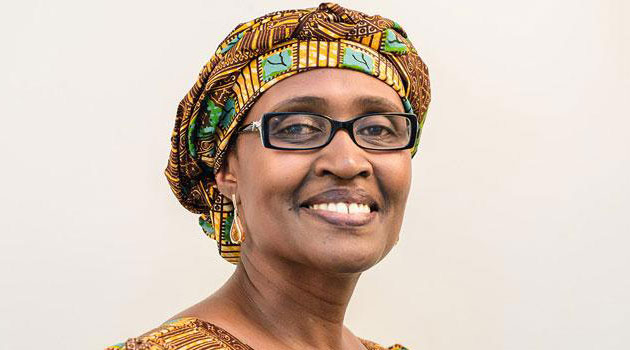NAIROBI, Kenya, 3 June – As you read this, Winnie Byanyima is probably delivering her speech at the 25th World Economic Forum – Africa which starts Wednesday in Cape Town, South Africa. The forum will bring political and business leaders from the continent and beyond under one roof.
The organisation she heads has been serving humanity by dignifying them in time of trouble for the last 70 years. Oxfam International is present in 95 countries and plans to launch six more branches in selected locations in Africa, Asia and Latin America.
Oxfam is a crusader of social justice and a humanitarian responder. For instance, the organisation recently sent relief in the form of water and sanitary items to Burundian refugees who had fled to Kigoma in Tanzania after a demonstrations broke out. In April, Oxfam rushed to Nepal after the country was hit by an earthquake that left more than 7,000 people dead.
“At any one time, Oxfam will respond to every major crisis around the world. We specialise in water, sanitation and ensuring food security is close to people in distress,” she says as we start the interview.
But when Byanyima took over as the Executive Director in 2013, the world had changed.
According to her, war was not what it used to be. Communities no longer went to war with one another like they used to, instead, rebel groups have taken over to terrorise people. “When we think of violence today, we think of Al-Shabaab, Boko Haram and the likes,” she explains.
Poverty was also not what was experienced in the past. Countries that were once considered very poor were quickly moving into Middle-Income countries. However, the intensity of poverty in those countries continued to worsen. Inequality, she says, is where the problem lies. “Africa has seven out of the 10 fastest growing economies in the world, yet, six out of the 10 most unequal countries are also in Africa. This is where the problem is,” she explains.
To break it down, forty percent of people in sub-Saharan countries are living on less than $1.25 per day. The numbers are set to increase. According to a finding by Oxfam, the absolute number of people living in poverty is projected to increase by over 50 million between 2011 and 2030, to 470 million people. The region also has the highest prevalence of people going hungry. The numbers are still increasing.
Natural calamities such as earthquakes were also more frequent and more intense, to which she blames entirely on climate change.
Position of Influence
The 56 year-old Byanyima is an Engineering graduate – a non-traditional women’s occupation in the first place- who did a year at Makerere before Uganda went into war under Idi Amin’s government leaving a young Winnie to flee to England to complete her studies at The University of Manchester.
More so, Byanyima was a three-time Member of Parliament in rural Uganda – another non-traditional occupation for women- has been in and out of jail a couple of times because of rebelling against the Ugandan government before landing a job at the African Union then at the UN where her devotion to humanitarian work and political activism really blossomed prior to joining Oxfam International.
Now she sits to reason with governments and has Secretary General of United Nations Ban Ki-Moon and the President of World Bank on her speed dial.
“Being able to call the President of The World Bank to challenge his organisation for lending money to a company that is grabbing land in Guatemala or Ecuador and he acts upon it is truly fulfilling,” she explains.
Seeing Oxfam working with marginalised communities in remote places is also fulfilling.
“Whenever I talk to people and they tell us that if it was not for Oxfam we probably would have died, that right there gives me purpose. It makes me want to do more.”
And to do more, she definitely is doing.
The executive has her short term goals at the organisation laid out. Apart from the additional Oxfam branches, she hopes the Organisation will strengthen its footing in all corridors of social justice. It will therefore be out and about challenging governments and companies to take responsibility as the fate of the people, especially in developing countries is on their hands.
But as we sip tea on the rooftop of one of Nairobi’s laidback yet cozy restaurants, Byanyima’s mind is onto something else entirely; “We need to get impatient with the way Africa’s huge wealth of natural resources is managed. We must also be more forceful about getting our leaders to prioritize the provision of free health and education to everyone and the creation of jobs for our youth because this is their responsibility,” she states.
Byanyima also challenges Africans everywhere to get impatient with their political leaders on issues such as observation of human rights, political stability and democracy.
This is especially because of the continent’s expected growth. According to Byanyima, Africa will probably exceed China in population by 2025, with majority of its population being youths, hence the fight for education and provision of jobs for them.
Africa, she says, has the necessary resources that are needed to eliminate poverty.
For instance, the continent has arable land that could feed almost half of the world and it also has most of the world’s natural resources.
She is therefore submitting a report to the World Economic Forum -Africa.
Dubbed ‘Africa: Rising for the few’, the report states that the continent is losing billions of dollars yearly as rich countries continue to reap the rewards of African resources.
Figuratively, Africa was cheated out of $10 billion in 2010 alone through trade mispricing by multinational companies to reduce their tax bills. An amount that is equivalent to more than six times what is needed to plug the funding gaps to deliver health care in Africa’s Ebola-affected countries.
“Where are our governments when this is happening?” she questions.
She is also calling out to the political and business leaders to address the elephant in the room; inequality and climate change saying that unless this is addressed, the continent will not make any progress.
As we conclude our interview, Byanyima discusses her love and devotion of seeing people, especially women, rise out of poverty. “Women in sub-Saharan Africa are hardest hit by poverty, earning an average of 30 percent less what men earn.”
She further encourages them to take the opportunity given to them with open hands. “African women today can enjoy working, going to school and earning meaningfully because of the price that was paid by three or four past generations of women who had to suffer fighting for these.”
She also discusses her life away from Oxfam speaking fondly about her husband and her 15 year-old son who wants to become a writer.
As we part, Byanyima honours me with a selfie as I wish her success on her mission to lobby for people’s rights at the World Economic Forum.
























